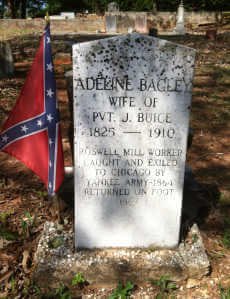"Only think of it! Four hundred weeping and terrified Ellens, Susans, and Maggies, transported in springless and seatless army wagons, away from their loves and brothers of the sunny South, and all for the offenses of weaving tent cloth."
Disclaimer: Although there are no personal accounts written by the women themselves, their voices are still silent. However, the evidence that is available confirms their plight, and although the disappearance of the Roswell women is somewhat shrouded in mystery, it is easy to fit the pieces of the puzzle together. I am not condemning nor condoning the actions of the U.S. Army during the Civil War.
Several years ago, I watched a story on PBS about a little-known event of the Civil War, telling myself that if I ever had the time, I'd love to create a historical romance based on the life of one of those women who was branded a traitor and sent North.
Fast forward to 2021 when I created the Mended Hearts series. Each book is based on true facts during the latter half of the Civil War. Marrying the Major released in November 2021, and Winning the Widow's Heart will release April 26th, finally telling the romance that had been in my heart and head for so long. The plight of the Roswell women has long been lost to the forgotten passageways of history, and this story is to give one woman a voice to her tragic tale.
At the time of the Civil War, 400 women were employed by the Roswell Mills in Roswell, Georgia. As production increased, so did the number of people living in the area. As the war dragged on the leading families of Roswell fled in advance of Sherman's army, leaving the fate of the mills and their employees to fend for themselves. These women had no choice but to work in the mills. In addition, they were forced to take their children with them. No doubt, they would have preferred to be elsewhere...tending home and hearth. Instead, these women wove cloth to outfit their husbands, sweethearts, fathers, brothers, and sons.
Sherman, looking for a way to get the army across the Chattahoochee, and thus into Atlanta, sent General Garrard to capture Roswell. Initially, the general promised no harm would come to the mill unless he found evidence they were supplying the Confederate army with goods (rope, canvas, tent cloth). Unfortunately, he did discover the letters "C.S.A." printed into the cloth and burned the mill.
Upon learning this, Sherman sent the message:
"..."I repeat my orders, that you arrest all people, male and female, connected with those factories, no matter the clamour, and let them foot it under guard to Marietta, the I will send them by cars to the North."
The women and children were given a short time to gather their belongings and then marched out to the Roswell town square where they waited long hours for supply wagons to transport them to Marietta. On their arrival, the millworkers were imprisoned in the abandoned Georgia Military Institute where they remained for the next week.
Marietta train station
From there, they were loaded into boxcars and given several days' rations. Not knowing where they were going or if they would return, they were not even the opportunity to leave messages for their loved ones.
"The train which arrived at Louisville from Nashville ...brought up from the South two hundred forty-nine women and children, who are sent by order of General Sherman..."
Once they arrived in the North, their hardships continued. Despite Sherman's assurances they would "live in peace and security", a very different future lay in store. There was no aid, no work and no shelter. Some of the refugees died of disease which reached epidemic proportions in late 1864.
Once the news of the atrocities suffered by these women reached the newspapers, both Northerners and Southerners were outraged.
"It is hardly conceivable that an officer bearing a United States commission of Major General should have so far forgotten the commonest dictates of decency and humanity...as to drive four hundred penniless girls hundreds of miles from their homes and friends to seek livelihood amid strange and hostile people."
So moved by the article, General Dodge, one of Sherman's commanders, took $100 from his pocket and instructed his chief surgeon to hire some of the Roswell girls to help care for his sick and wounded.
Whew, what an ordeal these women endured! Their fate of these workers has long been considered a mystery. Though a few returned to Roswell, many of them married men in Kentucky, Indiana, or Ohio and settled there. Returning to Roswell would have been very difficult especially for a young woman or single mother. Even if she obtained the means for the journey, she had no idea what awaited her in a land laid waste by Sherman's army.
Adeline Bagley Buice Grave Marker & Inscription
Roswell Mill Worker Caught & Exiled to Chicago by Yankee Army in 1964- Returned on Foot 1869
Below is a memorial dedicated to the 400 women and children who were lost to their families and to history.
For the past year--between writing for two MAPS series--I have read and researched this unfortunate, haunting, yet little-known episode in American history. I hope Winning the Widow's Heart will do the women's story justice.
Sources:
"The Roswell Mills: A Civil War Tragedy" by C.M. Dillman
"Days Gone by in Alpharetta & Roswell"
"The Long Walk Home: The Story of Adeline Bagley Buice
"Historic Roswell" by Joe McTyre, Rebecca Nash Paden









No comments:
Post a Comment